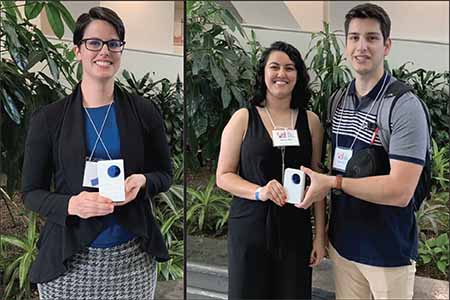
Alyssa Dye, graduating with a Master of Arts in Psychology, won first place in the Behavioral and Social Sciences, Graduate category with her research on depression in new fathers. Onkar Phul and Owen Roth won first place in the Physical and Mathematical Sciences, Undergraduate category with their research on the ability of an enzyme to degrade chlorobenzene.
The system-wide competition awards first and second places in 22 categories. Participants gave an oral presentation before a jury of professional experts from universities, foundations, public agencies and the private sector.
“Winning the CSU Statewide Research Competition in behavioral and social sciences is an incredible accomplishment. I understand the field was laden with excellent work, so to be able to win first place among such heavy competition speaks for itself,” said Stan State Psychology Professor Kurt Baker, Dye’s faculty sponsor.
Dye, who hails from Manteca, became interested in her topic through a support group she was co-facilitating. “I realized paternal perinatal depression is more prevalent than we realize and very under-researched,” she said. She did a qualitative study of the phenomenon, which affects an estimated 12.5 percent of new fathers.
Her research focused on what helped or hindered these fathers in getting care and support. “We found stigma related to ideas about masculinity to be a prominent theme related to barriers to seeking help,” Dye said. Social support from another father, however, proved a strong positive in seeking help.
The project helped crystalize her career goal of becoming a counseling psychologist with a focus on perinatal mental health. She will start a counseling psychology doctoral program at the University of Kansas this fall.
“This research has been pivotal for me. I became more passionate about this topic with every interview with a father. I now plan to continue with this area of research throughout my career,” Dye said.
Dye’s research was underwritten by University grants and other awards from Student Engagement in Research, Scholarship and Creative Activity (SERSCA) funds. The work of Phul and Roth was supported through the CSU Program for Education & Research in Biotechnology (CSUPERB). Roth’s time was paid through the University Research, Scholarship, and Creative Activity (RSCA) program.
Phul and Roth, though coming from different disciplines, worked well as a team, said Biochemistry Assistant Professor Gönül Schara, their faculty sponsor. “Their complementary skills helped them achieve the research’s objectives in the lab and win this award at the research competition,” Schara said.
Their winning presentation in the Physical and Mathematical Sciences category was titled: Characterization of Toluene o-Xylene Monooxygenase for Chlorobenzene Degradation. Chlorobenzene is a volatile liquid, toxic to marine life, mostly used in pesticides and degreasers. Their research studied for the first time the chemical created by degrading chlorobenzene with the ToMo enzyme, expanding on Schara’s work with previous students showing ToMO’s potential for biotechnological and environmental applications.
“I was very excited for the research experience in biochemistry and when I began to look into the harm that chlorobenzene could cause, I was very excited to degrade it,” said Phul. “The remarkable protein can degrade chlorobenzene and turn it into industrially valuable compounds. It felt like being a superhero.”
Phul, from Patterson, is a graduating senior in chemistry with a concentration in biochemistry. She will be applying to graduate school over the coming year with a long-term goal of teaching chemistry at a community college.
Roth, from Seattle, will graduate in 2020 with a double major in microbiology and biochemistry. After graduating, he plans to head to medical school to be a practicing doctor doing clinical research.
This was his second year participating in undergraduate research, an avenue he recommends for all science majors. “To my surprise, being actively involved in research over a relatively long period of time has actually helped me a lot in the classroom,” Roth said. “Understanding the way in which scientific research is conducted and understanding how to interpret results has definitely helped me when studying, regardless of the subject.”